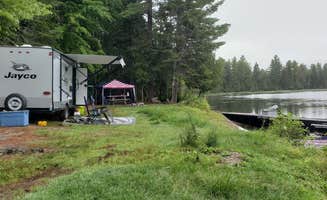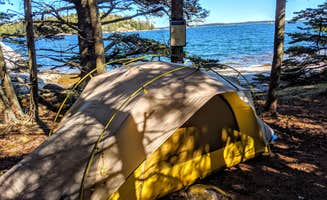Dispersed camping near Hermon, Maine provides affordable outdoor options for wilderness enthusiasts seeking primitive experiences with minimal amenities. The area features a mix of forest and lake environments with elevation ranging from 400-600 feet above sea level. Winter temperatures often drop below freezing from November through March, while summer brings mild 70-80°F temperatures and moderate humidity levels.
What to do
Boating opportunities: At Seboeis Public Lands, the large lake supports various watercraft with a boat ramp and small dock available. "The campground is open year round, but you'll need a snowmobile or skis to get in during the winter," notes camper Jean C., adding that boating conditions "can get choppy when it's windy."
Island exploration: Buckle Island offers accessible shoreline exploration along its granite and sandy beaches. "We stayed at the site by the shore and had a gorgeous view of the sun setting," reports Shari G., who appreciated the island's natural features and easy landing areas.
Seasonal recreation: Winter access to free camping sites requires specialized transportation but rewards visitors with solitude. During summer months, swimming and fishing dominate recreational activities, while fall brings hunting opportunities to public land areas.
What campers like
No-cost wilderness experience: Free camping near Hermon attracts budget-conscious outdoor enthusiasts. Seboeis Public Lands permits extended stays without fees, providing economical options for longer wilderness trips.
Water access: Campers appreciate the lakefront and island locations. One visitor at Buckle Island mentioned the practicality of its shore: "This is a perfect island for those new to sea kayak camping as the sandy shore, which is exposed for a good portion of the day, is easy to land on."
Wildlife viewing: The natural settings support diverse wildlife observation opportunities throughout the seasons. Early mornings and evenings offer prime viewing times for deer, moose, and various bird species.
What you should know
Limited amenities: Primitive camping means self-sufficiency is essential. "Come prepared with fresh water (there is no fresh water for filtering) and wag bags (no toilets)," advises a Buckle Island camper, highlighting the need for complete preparation.
Seasonal road conditions: Access roads to dispersed camping areas transition from paved to gravel and may become impassable in adverse weather. Road quality deteriorates progressively farther from main routes.
Campsite competition: Popular waterfront sites fill quickly, especially during summer weekends and holidays. Weekday arrivals increase chances of securing preferred locations at no-fee camping areas near Hermon, Maine.
Tips for camping with families
Safety preparation: Pack additional safety supplies when bringing children to remote camping areas. Each child should have their own whistle, headlamp, and water bottle labeled with their name.
Site selection: Choose less remote camping locations for first-time family trips. More accessible sites provide quicker evacuation options if weather turns unfavorable or emergencies arise.
Communication planning: Establish clear communication protocols with children before arrival. Cell service limitations mean physical check-ins and predetermined meeting points become essential safety measures.
Tips from RVers
Road assessment: Scout access roads before bringing larger vehicles to dispersed camping areas. Most primitive sites have limited turnaround space and may have low-hanging branches or soft shoulders.
Leveling requirements: Pack additional leveling blocks for uneven terrain. Dispersed sites rarely offer level parking areas, requiring significant adjustment for comfortable overnight stays.
Water management: Calculate water needs carefully as no hookups or refill stations exist at primitive camping locations. Plan for 2-3 gallons per person per day minimum, with additional reserves for unexpected weather delays.



